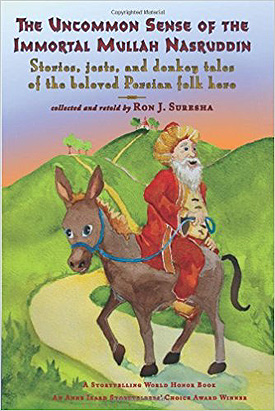 The subtitle calls The Uncommon Sense of the Immortal Mullah Nasruddin a collection of “stories, jests, and donkey tales of the beloved Persian folk hero.” Nasruddin, though, is more than simply Persian — he’s an avatar of the Wise Fool found in folklore everywhere. In this case, as editor/author Ron Suresha notes, the Middle East is home to a genre of mullah (or sheikh) humor that draws on Persian, Turkish and Arabic tales that probably originally drew on each other and perhaps, in my own estimation, derive ultimately from something fairly universal in human lore.
The subtitle calls The Uncommon Sense of the Immortal Mullah Nasruddin a collection of “stories, jests, and donkey tales of the beloved Persian folk hero.” Nasruddin, though, is more than simply Persian — he’s an avatar of the Wise Fool found in folklore everywhere. In this case, as editor/author Ron Suresha notes, the Middle East is home to a genre of mullah (or sheikh) humor that draws on Persian, Turkish and Arabic tales that probably originally drew on each other and perhaps, in my own estimation, derive ultimately from something fairly universal in human lore.
The historical Nasruddin was a teacher, judge, courtier and community leader, transformed through the magic of folklore into a buffoon (and folklore does have a tendency to deflate the mighty). Suresha has given us a contemporary reworking of the tales (the stories fit for a general audience, at least — folklore also has a tendency to be somewhat raunchy, but those he has saved for another collection), organized according to the tradition of telling the stories of Nasruddin in sevens.
The stories themselves are told somewhat artlessly, and to Suresha’s credit he has maintained the direct, unadorned style that is a hallmark of folk tales. It’s roughly chronological, but only roughly: there are stories of Nasruddin’s childhood (and he was something of a flake, even then), his young manhood, his married life (some of the funniest), and stories of his later years, which give us the reigning image of the mullah: a white-bearded sage riding backwards on his beloved little grey donkey (a compromise, he claimed, between where he wanted to go and where the donkey was headed), followed by a gaggle of students.
This artless quality derives at least in part from Nasruddin himself, who is in the tradition of the Fool, one of nature’s innocents, with a direct way of looking at things that may not always make sense to the rest of us, but is always refreshing — Nasruddin seems to alternate between Village Idiot and Trickster, and one is never quite sure which is which at any given moment. Maybe it’s just that he marches to his own drummer — his contact with reality is sometimes delightfully loose.
I had thought to outline a couple of stories as examples, but they are so tight and so strongly interrelated — and as often as not, so brief — that I found them impossible to summarize. The groups each focus on a particular part of Nasruddin’s life, and are often built around the same events, coming in from different directions and often coming to different conclusions.
This is a collection to be taken in small doses. There is a pattern to the stories that too easily becomes repetitive if taken too many at a time, but in their groupings of sevens, they are a delightful break from the everyday world for an hour or two.
(Lethe Press, 2011)
